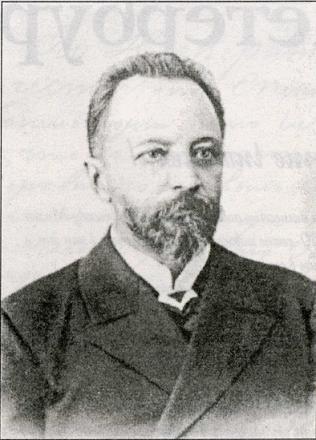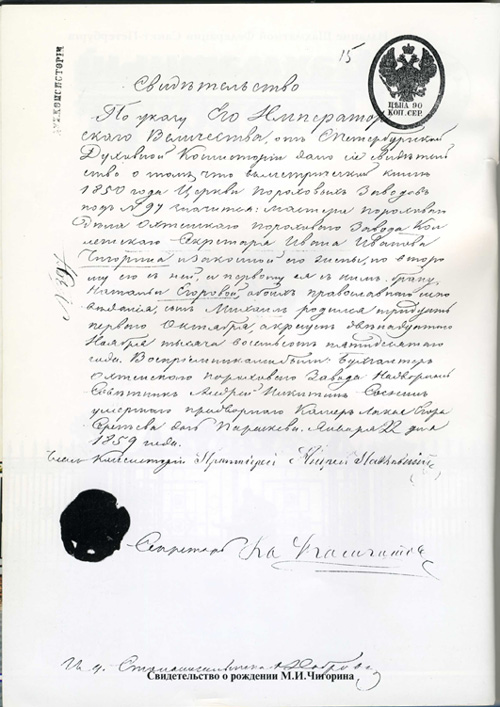21.06.2007
A.Kentler. CROSSROADS: WITHOUT M.I.CHIGORIN
This is a bit surprising, as there is still another half a year to the date. Apparently, to wait was unbearable. And if the author were not in such a hurry, some mistakes in the article would probably be corrected. The author mentions the memorial plaque on the Orphans' Institute building in Gatchina but does not tell anything about another memorial plaque on the 9th Krasnoarmeyskaya (former 9th Roty) Street 15, where Mikhail Ivanovich has lived during his last St. Petersburg years. S.Karastelin reports that " in November the final tournament of the ХVIII championship of the USSR (it was finished on December 12, 1950 - A.K.), dedicated to Chigorin's centennial anniversary, and also of the mass tournament, in which more that 720 thousand chessplayers had taken part (the winner of the tournament was Vassily Smyslov)" were held in Moscow. The final tournament won by Vassily Vassilyevich took place in January and February 1951, in Leningrad. The statement that from 1963 till 1990 the Chigorin Memorial had been held exclusively in Sochi is incorrect – in 1972 Kislovodsk hosted the tournament. On the other hand, the author is perfectly right in counting 21 Chigorin tournaments that have been held in Sochi from 1963 till 1990. But then it is not clear at all what has become of Kislovodsk. For some reasons the St.Petersburg tournaments are not counted at all, there are only a few words about special post stamps with which the envelopes have been franked during the tournament dedicated to M.I.Chigorin's 150th anniversary (the lineup of this tournament was really magnificent). But at the same time the program of the tournament in Gatchina, "the birthplace of the great chessplayer", is expounded on in detail. I am already sick and tired of fighting against Gatchina being proclaimed Chigorin's birthplace. There is not a single proof of this statement; but there are documents indicating that Chigorin has been born on Okhta on the territory of the Gunpowder factory where the family lived. Mikhail Ivanovich was baptized exactly in the Gunpowder factory church. Before writing this material I browsed the "Chigoriana" in the Web. Everyone states that Mikhail Ivanovich was born in Gatchina, everyone refers to N.I. Grekov, and Grekov himself refers to M.S. Kogan. It should be noticed that it was Kogan who had indicated Gatchina as Chigorin's birthplace. Mikhail Saulovich, usually so careful of details, does not refer to any document here. While preparing "The Book Of Chigorin" dedicated to the great chessplayer's 150th anniversary, I had looked over every file and document on him mentioned by Kogan in his works, in the archives; I had also examined other material. Neither in the archives nor in Chigorin's personal files in the Orphans' Institute, St. Petersburg District and Suburban Police Department (the only working place of Mikhail Ivanovich's from 1871 till 1883) there is not a single mention of his being born in Gatchina. There is only a document cited above. Chigorin himself had never ever reported the details of his biography anywhere. Others did it for him. I found three mentions of his birthplace in the different editions published in his lifetime. St. Petersburg was indicated twice, including in E. Schiffers work, and Gatchina only once (apparently someone had confused Chigorin's birthplace and the place where he studied). I have written before that M.S.Kogan made a mistake in Chigorin's father year of birth. Probably his information about Mikhail Ivanovich's birthplace was also incorrect. Finally I'd like to mention once again that neither of the experts on history of Gatchina has at his disposal a single fact about any building or even district of the city being connected with Chigorin or any member of his family, the Orphans' Institute excepted. S.Karastelin writes that Chigorin "died after having spent his last days at the strangers' in highly depressive condition under influence of which he had even burned his favorite wooden traveling set of chess pieces..." The discussion on whether Mikhail Ivanovich has burned he chess pieces or not is about a century old. E.A. Znosko-Borovsky in his "Chigorin's Tragedy" depicts how on the eve of his death Chigorin ordered his favorite traveling set of chess pieces brought up to him and then burned. After only ashes had been left of the pieces he calmed down "lost consciousness and never again regained it". M.S.Kogan in his "Chigorin's Petersburg" tells how dying Chigorin has asked his wife to leave the room (talking about "the strangers" – he was nursed by his wife and daughter - A.K.) and said to Gudima, his close friend, that "he was going to fantasticate now": tried to choke him, but then "fell backwards" and "breathed his last". Curiously enough, both evidence belong to the same person – G.A.Gelbak (the second one was written down by him in 1920s), and his own source has been the above-mentioned Gudima. N.I.Grekov wrote in his book "M.I.Chigorin" first published in 1939 that he had personally talked to Gelbak, who described those events in a confused way. Some words about M.I.Chigorin's last days. Here is A. Makarov's evidence published in the "Novoye Vremya" ("New Times") newspaper on January 21,1908 (in the chess section edited by E.A. Znosko-Borovsky): Last year the late M.I.Chigorin already suffered from gout in his legs. This summer after the Nuremberg tournament he went to Carlsbad to receive medical treatment. There the doctor the and chessplayer called Neumann prescribed him to take the waters and watched over the treatment. After returning to Petersburg M.I. still felt ill as he had developed diabetes. In November he almost never left his room in Dmitrovsky Lane where he had been living without any surveillance or care. So I persuaded him to go to Elena Pavlovna's clinic where he spent a month starting from November 28. Before Christmas M.I. became melancholy and decided to leave the clinic and go to Lublin to his wife and daughter. Some years ago M.I.'s family moved to Lublin after his closest friend General Dubravin had been transferred to serve there, as M.I.'s daughter and Dubravin's children were attending the local gymnasia together. Already in Professor Afanasiev's clinic M.I.'s condition had been regarded by the doctors as hopeless. Having come to Lublin, M.I. felt so ill than was not able even to right letters from Lublin, and on January 12 he died in his wife and daughter's arms. The report on the reinterment was published in "Golos Moskvy" ("Voice of Moscow") on Tuesday, June 24, 1914, page.2 ("Body Transferred From Lublin To Petrograd"): On June 22 the remains of well-known Russian chessplayer M.I.Chigorin, who had died in the city of Lublin on January 12, 1908, were brought to Petersburg. Exactly 8 persons gathered to pay their last respects to the deceased. By the time they got to the cemetery this handful of M.I.Chigorin's friends had been reduced still more. No relative of the deceased was present. The office for the dead had been served at the Novodevichiy monastery cemetery, and the remains were committed to the earth. In autumn the tombstone will be erected on the grave. The money for the memorial is collected by Russian chessplayers. Unfortunately, there are lots of enormous blank spots in the "Chigoriana". We do not know anything about the fate of his family. All that is known is that soon after his death his daughter was in Kiev (anyway, in 1909 she was carrying negotiations with St.Petersburg chess assembly on selling her late father's library from there). It is not clear how many daughters Chigorin had – his daughter by his first wife could not attend the Lublin gymnasia as she should be more than 20 years old by that time. Not only the library but also the whole Chigorin's archive that had also been bought from the family disappeared. Perhaps it is not so bad that the article about M.I.Chigorin appeared before the centenary of his death after all. Maybe someone will start searching without waiting for January and gather the grains of evidence on the times when chess has been making its first steps in Russia...
In the section "The Past" of "64-ShO" magazine No. 6 a lengthy (5 pages) article by Sergei Karastelin "In Memory Of Chigorin" (to the centenary of the great chessplayer' death) was published.

Chigorin died not on January 12, as S.Karastelin says, but on the same date Old Style, i.e. on January 25. His remains were not brought to Russia from Lublin in 1908, as the author thinks. It happened 6 and a half years later. M.I.Chigorin's remains were buried at the Novodevichiy monastery cemetery (Moskovskiy Avenue 100) on June 22, 1914. 

On January 28 (15 Old Style) M.I.Chigorin was buried in Lublin.
